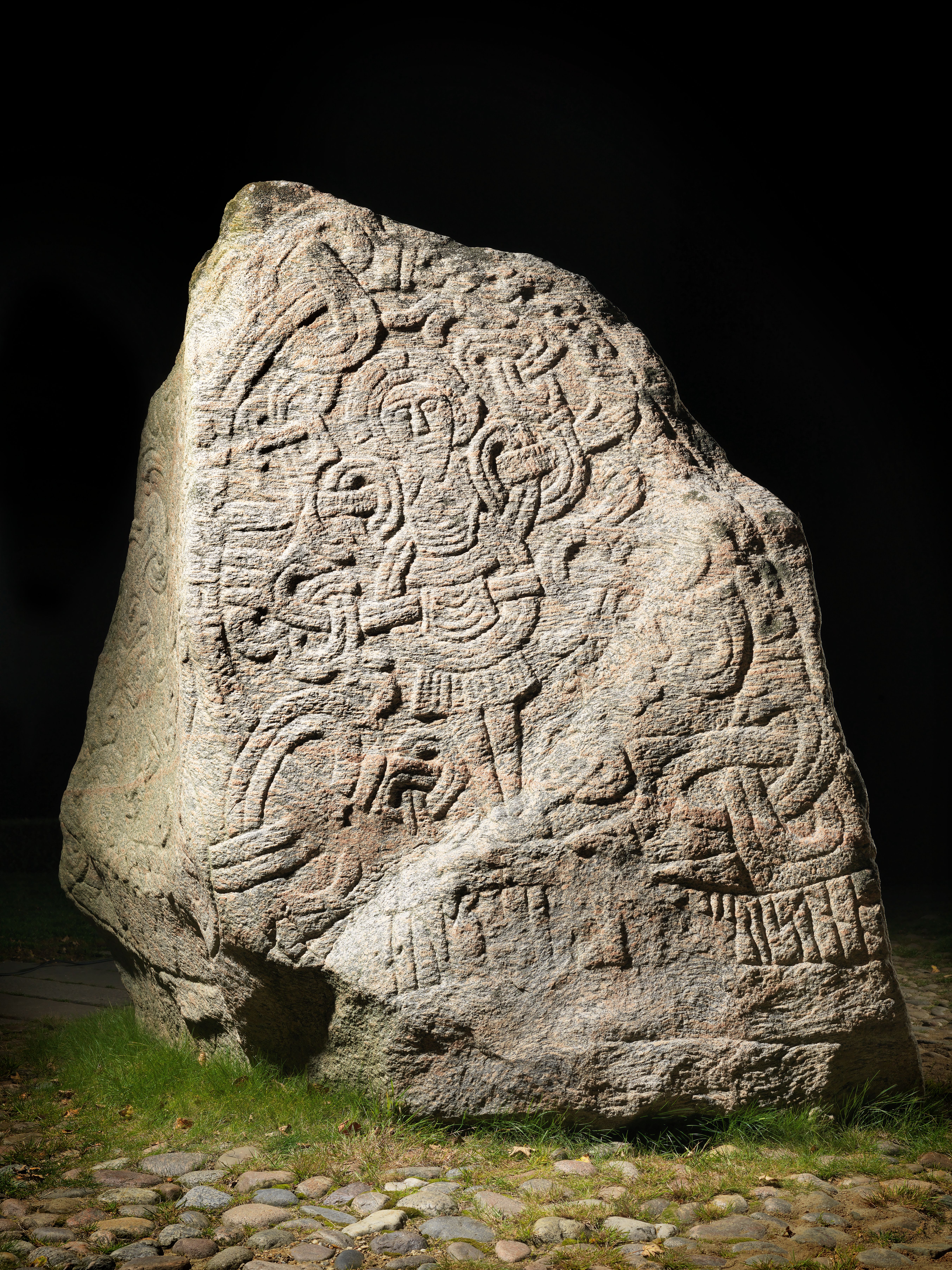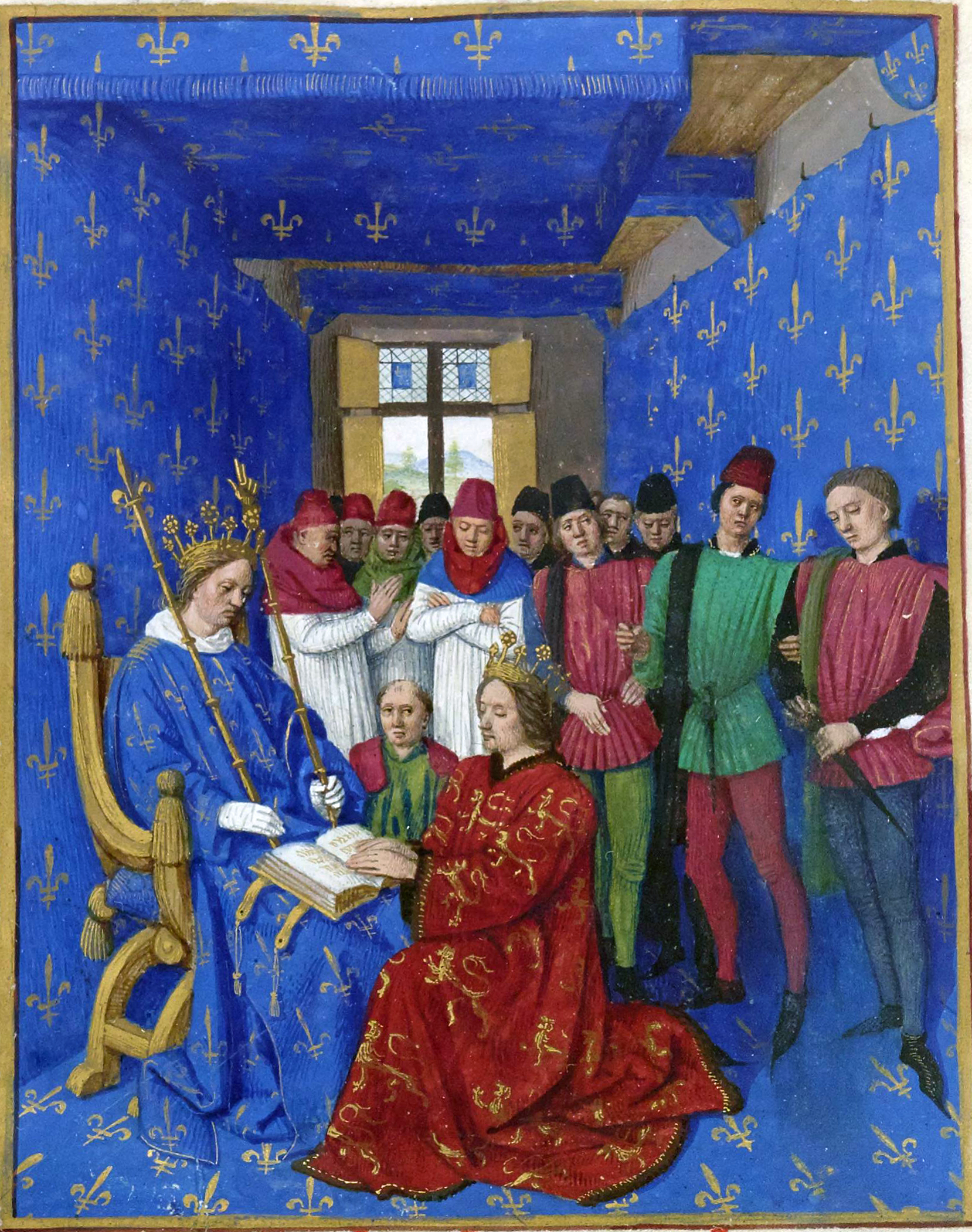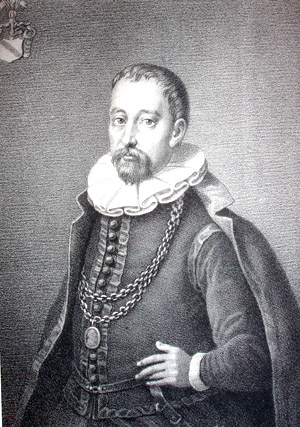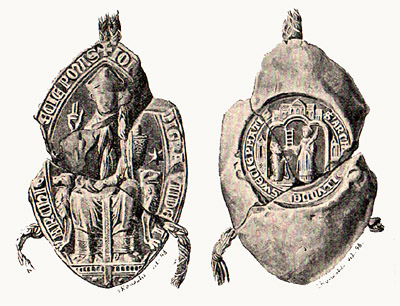|
Erik VI Of Denmark
Eric VI Menved (1274 – 13 November 1319) was King of Denmark (1286–1319). A son of King Eric V and Agnes of Brandenburg, he became king in 1286 at age 12, when his father was murdered on 22 November by unknown assailants. On account of his age, his mother ruled for him until 1294. Regency Eric Menved's rule was a central period during the “Age of Decay" in Denmark 1241–1340. His early reign – during which he was led by his mother and her German relatives – was affected by the unrest and wars that followed the murder of his father. The first act of the new government was to settle the case of the former king's murder at a court convened at Nyborg at Whitsun 1287. 27 honorable men were appointed to decide the case. Chief among the accused were Marshal Stig Andersen Hvide and Jacob Nielsen, Count of Halland and seven others were accused. After a one-day trial, the jury found all the accused guilty. The properties and incomes of the condemned were declared forfeit and ... [...More Info...] [...Related Items...] OR: [Wikipedia] [Google] [Baidu] |
King Of Denmark
The monarchy of Denmark is a constitutional political system, institution and a historic office of the Kingdom of Denmark. The Kingdom includes Denmark proper and the autonomous administrative division, autonomous territories of the Faroe Islands and Greenland. The Kingdom of Denmark was already consolidated in the 8th century, whose rulers are consistently referred to in Franks, Frankish sources (and in some late Frisians, Frisian sources) as "kings" (). Under the rule of King Gudfred in 804 the Kingdom may have included all the major provinces of medieval Denmark. The current unified Kingdom of Denmark was founded or re-united by the Vikings, Viking kings Gorm the Old and Harald Bluetooth in the 10th century. Originally an elective monarchy, it became hereditary monarchy, hereditary only in the 17th century during the reign of Frederick III of Denmark, Frederick III. A decisive transition to a constitutional monarchy occurred in 1849 with the writing of the first democrat ... [...More Info...] [...Related Items...] OR: [Wikipedia] [Google] [Baidu] |
Miscarriage Of Justice
A miscarriage of justice occurs when a grossly unfair outcome occurs in a criminal procedure, criminal or civil procedure, civil proceeding, such as the conviction and punishment of a person for a crime they actual innocence, did not commit. Miscarriages are also known as wrongful convictions. Innocent people have sometimes ended up in prison for years before their conviction has eventually been overturned. They may be exonerated if new evidence comes to light or it is determined that the police or prosecutor committed some kind of misconduct at the original trial. In some jurisdictions this leads to the payment of compensation. Academic studies have found that the main factors contributing to miscarriages of justice are: eyewitness identification, eyewitness misidentification; faulty forensic analysis; false confessions by vulnerable suspects; perjury and lies stated by witnesses; police misconduct, misconduct by police, prosecutorial misconduct, prosecutors or judicial miscondu ... [...More Info...] [...Related Items...] OR: [Wikipedia] [Google] [Baidu] |
Mecklenburg
Mecklenburg (; nds, label=Low German, Mękel(n)borg ) is a historical region in northern Germany comprising the western and larger part of the federal-state Mecklenburg-Western Pomerania. The largest cities of the region are Rostock, Schwerin, Neubrandenburg, Wismar and Güstrow. The name Mecklenburg derives from a castle named '' Mikilenburg'' (Old Saxon for "big castle", hence its translation into New Latin and Greek as ), located between the cities of Schwerin and Wismar. In Slavic languages it was known as ''Veligrad'', which also means "big castle". It was the ancestral seat of the House of Mecklenburg; for a time the area was divided into Mecklenburg-Schwerin and Mecklenburg-Strelitz among the same dynasty. Linguistically Mecklenburgers retain and use many features of Low German vocabulary or phonology. The adjective for the region is ''Mecklenburgian'' or ''Mecklenburgish'' (german: mecklenburgisch, link=no); inhabitants are called Mecklenburgians or Mecklenburgers ( ... [...More Info...] [...Related Items...] OR: [Wikipedia] [Google] [Baidu] |
Rostock
Rostock (), officially the Hanseatic and University City of Rostock (german: link=no, Hanse- und Universitätsstadt Rostock), is the largest city in the German state of Mecklenburg-Vorpommern and lies in the Mecklenburgian part of the state, close to the border with Pomerania. With around 208,000 inhabitants, it is the third-largest city on the German Baltic coast after Kiel and Lübeck, the eighth-largest city in the area of former East Germany, as well as the 39th-largest city of Germany. Rostock was the largest coastal and most important port city in East Germany. Rostock stands on the estuary of the River Warnow into the Bay of Mecklenburg of the Baltic Sea. The city stretches for about along the river. The river flows into the sea in the very north of the city, between the boroughs of Warnemünde and Hohe Düne. The city center lies further upstream, in the very south of the city. Most of Rostock's inhabitants live on the western side of the Warnow; the area east of th ... [...More Info...] [...Related Items...] OR: [Wikipedia] [Google] [Baidu] |
Martin Of Dacia
Martin of Dacia (Martinus Dacus, Martinus de Dacia, Morten Mogensen, ca. 1240 - August 10, 1304) was a Danish scholar and theologian. He authored ''De Modi significandi '' (ca. 1270), an influential treatise on grammar. Biography Morten Mogensen was born at Ribe in Jutland probably in the late 1240s or early 1250s. Mogensen received his theological doctorate in Paris where he obtained the degree of a Magister artium and Magister theologiae. From the 1290s, he held a Prebendary as Canon of the Ribe Cathedral in the Ribe diocese as well as Provost of Schleswig and Canon of Lund. In Schleswig, Mogensen established a vicarage in the parish of Sywertmanrip. Mogensen was mentioned in 1288 as royal chancellor of Danish King Eric VI Menved (reign 1286 –1319). In the dispute between Jens Grand, Archbishop of Lund, and King Eric VI Menved, Mogensen arranged a royal rapprochement to Pope Boniface VIII, which in 1302 resulting in a settlement of the dispute. In 1302 he ... [...More Info...] [...Related Items...] OR: [Wikipedia] [Google] [Baidu] |
Boniface VIII
Pope Boniface VIII ( la, Bonifatius PP. VIII; born Benedetto Caetani, c. 1230 – 11 October 1303) was the head of the Catholic Church and ruler of the Papal States from 24 December 1294 to his death in 1303. The Caetani family was of baronial origin, with connections to the papacy. He succeeded Pope Celestine V, who had abdicated from the papal throne. Boniface spent his early career abroad in diplomatic roles. Boniface VIII put forward some of the strongest claims of any pope to temporal as well as spiritual power. He involved himself often with foreign affairs, including in France, Sicily, Italy and the First War of Scottish Independence. These views, and his chronic intervention in "temporal" affairs, led to many bitter quarrels with Albert I of Germany, Philip IV of France, and Dante Alighieri, who placed the pope in the Eighth Circle of Hell in his ''Divine Comedy'', among the simoniacs. Boniface systematized canon law by collecting it in a new volume, the ''Liber Sextus ... [...More Info...] [...Related Items...] OR: [Wikipedia] [Google] [Baidu] |
Arild Huitfeldt
Arild Huitfeldt (Arvid) (11 September 1546 – 16 December 1609) was a Danish historian and state official, known for his vernacular Chronicle of Denmark. Life Huitfeldt was born into an aristocratic family from Scania, part of the Kingdom of Denmark at the time. He was partly educated in Germany and France, made his career as a state official and was, from 1573 to 1580, First Secretary to the Danish Chancellery, the King's central administrative organ. From 1583 to his death he was also superintendent at Herlufsholm School, the first Danish boarding school. In 1586 he achieved his highest appointment, becoming ''Rigskansler'' ( Chancellor of the Realm, the very approximate equivalent to a modern Minister of Justice), until shortly before his death. Huitfeldt also owned several manor estates and handled a number of diplomatic assignments. As a politician and as an official he appears to have been studious, conservative, and sociable, avoiding overt clashes with his colleagues. ... [...More Info...] [...Related Items...] OR: [Wikipedia] [Google] [Baidu] |
Jens Grand
Jens Grand, ''the Firebug'' (Low German: ''Fürsate'', Swedish: ''Fursat'') (about 1260 - 29 May 1327 in Avignon) was a Danish archbishop of Lund (1289–1302), titular Archbishop of Riga and Terra Mariana (1304–1310), and Prince-Archbishop of Bremen (as John I 1310–1327), known as the central figure of the second ecclesiastical struggle in Denmark in the late 13th century. He was an outstanding jurist of canon law. Grand was the son of Torbern Hvide, an officer at the Danish royal court, and of Cæcilie Skjalmsdatter, a sister of Peder Bang, Bishop of Roskilde. Bang and Cæcilie were also members of the Hvide clan, which came into conflict with the Danish throne through Stig Andersen Hvide's regicide of King Eric V ''Klipping'' in 1286. Grand studied at the University of Paris and received a degree as a doctor of canon law. About 1280 he gained a prebend as canon of the Roskilde Cathedral and in 1283 he advanced to the post of cathedral provost. Possibly Grand was an acco ... [...More Info...] [...Related Items...] OR: [Wikipedia] [Google] [Baidu] |
Falster
Falster () is an island in south-eastern Denmark with an area of and 43,398 inhabitants as of 1 January 2010."Danmarks Statistik." Retrieved 28 June 2010. Located in the , it is part of and is administered by Guldborgsund Municipality. Falster includes Denmark's southernmost point, , near |
Stubbekøbing
Stubbekøbing () is a town with a population of 2,268 (1 January 2022) The Mobile Statbank from in in on the northeastern coast of the island of i ... [...More Info...] [...Related Items...] OR: [Wikipedia] [Google] [Baidu] |
Eric IV Of Denmark
Eric IV, also known as Eric Ploughpenny or Eric Plowpenny ( da, Erik Plovpenning), ( – 10 August 1250) was king of Denmark from 1241 until his death in 1250. His reign was marked by conflict and civil wars against his brothers. Early life Eric was the son of Valdemar II of Denmark and brother of King Abel of Denmark and King Christopher I of Denmark. He was born ca. 1216 as the second legitimate son of King Valdemar II by his second wife Berengária of Portugal. In 1218, when his older half-brother Valdemar the Young was crowned king as their father's co-ruler and designated heir, he was created Duke of Schleswig. After the premature death of Valdemar in 1231, Eric was crowned king at Lund Cathedral 30 May 1232 as his father's co-ruler and heir. Subsequently, he ceded the Duchy of Schleswig to his younger brother Abel. When his father died in 1241, he ascended to the throne. Rule His rule was marked by bitter conflicts, especially against his brother, Duke Abel of Schlesw ... [...More Info...] [...Related Items...] OR: [Wikipedia] [Google] [Baidu] |
Haakon V Of Norway
Haakon V Magnusson (10 April 1270 – 8 May 1319) ( non, Hákon Magnússon; no, Håkon Magnusson, label=Modern Norwegian) was king of Norway from 1299 until 1319. Biography Haakon was the younger surviving son of Magnus the Lawmender, King of Norway, and his wife Ingeborg of Denmark. Through his mother, he was a descendant of Eric IV, king of Denmark. In 1273, his elder brother, Eirik, was named junior king under the reign of their father, King Magnus. At the same time, Haakon was given the title "Duke of Norway", and from his father's death in 1280, ruled a large area around Oslo in Eastern Norway and Stavanger in the southwest, subordinate to King Eirik. Haakon succeeded to the royal throne when his older brother died without sons. In 1295, Haakon married firstly with Isabelle, daughter of Jean I, Count of Joigny, but she died in 1297 without children. His eldest daughter was Princess Agnes Haakonsdatter. Family connections between Haakon V and the later Østby fami ... [...More Info...] [...Related Items...] OR: [Wikipedia] [Google] [Baidu] |







.jpg)